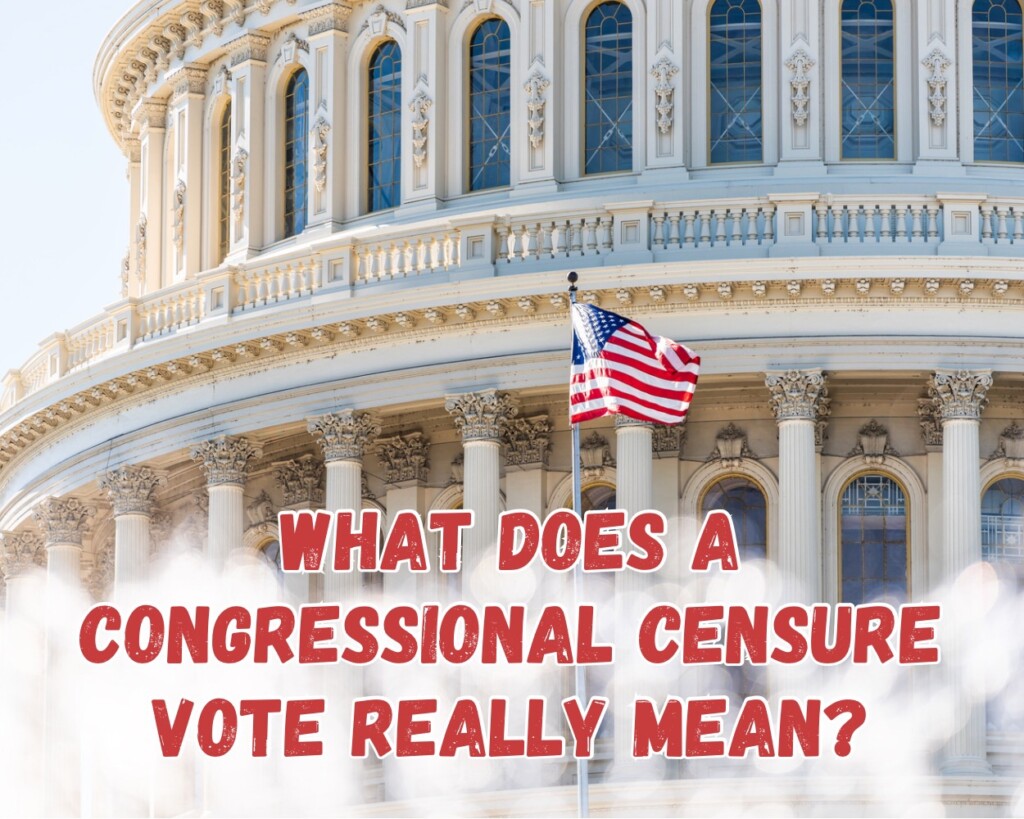The Concept of Censure in Congress
Censure is a formal reprimand or condemnation of a member of Congress by their peers. While it doesn’t remove the individual from office, it serves as a public statement of disapproval and can have political ramifications. The upcoming vote to censure Representative Rashida Tlaib has brought this parliamentary tool back into the spotlight.
What Does a Censure Vote Mean?
A Formal Rebuke
A censure vote is a formal way for Congress to express its disapproval of a member’s actions or statements. It is a resolution that is debated and voted upon by either the House of Representatives or the Senate, depending on where the member serves.

Not Legally Binding
It’s important to note that a censure is not legally binding. It does not remove a member from office or lead to any legal penalties. However, it can damage a member’s reputation and potentially impact their future in politics.
A Matter of Record
Once a member is censured, the censure becomes a matter of public record. This can be used against the member in future elections and can also lead to the loss of committee assignments or other privileges within Congress.
The Vote to Censure Tlaib: An Example
The upcoming vote to censure Representative Rashida Tlaib is an example of how this process works. Typically, a member or group of members will introduce a censure resolution outlining the reasons for the censure. The resolution is then debated, and a vote is taken. If the resolution passes, the member is formally censured.
Frequently Asked Questions: Censure in Congress
What’s the Difference Between Censure and Expulsion?
Censure is a formal reprimand, while expulsion removes a member from Congress. Expulsion requires a two-thirds majority vote, making it a much more severe and less common action.
Can a Censured Member Run for Re-election?
Yes, a censured member can run for re-election. However, the censure could be used against them in a campaign, potentially affecting the outcome.
How Often Are Censure Votes Used?
Censure votes are relatively rare and are usually reserved for cases of ethical violations, misconduct, or actions deemed to be in severe breach of the norms and values of Congress.
The Weight of a Censure Vote
While a censure vote may not have legal ramifications, it carries a significant weight of public and political opinion. It serves as a formal statement by Congress that a member’s actions or statements are not in line with the body’s expectations or standards. In the case of the vote to censure Tlaib, like any censure vote, the outcome will be closely watched and could have implications for the member’s political future.
The Intricacies of Congressional Censure
A censure is an official reproof or denouncement of a Congressional member by their colleagues. While it doesn’t lead to expulsion, it serves as a formal expression of collective disapproval and can carry political consequences. The forthcoming censure vote against Representative Rashida Tlaib has reignited interest in this legislative mechanism.
The Essence of a Censure Vote
An Official Admonishment
A censure vote serves as an institutional way for Congress to voice its displeasure regarding a member’s conduct or remarks. The resolution for censure is deliberated and voted upon in either the House or Senate, depending on the chamber in which the member serves.
Lacks Legal Force
It’s crucial to understand that a censure carries no legal weight. It neither ousts a member from their position nor imposes any legal sanctions. However, it can tarnish a member’s standing and influence their political trajectory.
Permanent Record
Once a censure is enacted, it becomes part of the public record. This can be leveraged against the member in subsequent elections and may result in the forfeiture of committee roles or other Congressional privileges.
The Tlaib Censure Vote: A Case Study
The impending censure vote against Representative Rashida Tlaib serves as a real-world example of this procedure. Generally, one or multiple members introduce a censure resolution detailing the grounds for the action. Following debate, a vote is conducted. If the resolution gains approval, the member receives an official censure.
Common Questions: The Nuts and Bolts of Congressional Censure
How Does Censure Differ from Expulsion?
While censure is a formal reproof, expulsion results in a member’s removal from Congress. Expulsion is a more drastic measure requiring a two-thirds majority vote.
Is a Censured Member Eligible for Re-election?
Absolutely, a censured member remains eligible to run for re-election. However, the censure could be a campaign issue that influences voter decisions.
How Frequently Do Censure Votes Occur?
Censure votes are relatively uncommon and are generally reserved for instances of ethical lapses, misconduct, or actions considered to be a severe violation of Congressional norms.
The Significance of a Censure Vote
Though lacking in legal repercussions, a censure vote holds considerable sway in the court of public and political opinion. It serves as Congress’s formal declaration that a member’s actions or statements are not congruent with its values or expectations. In the context of the vote against Rep. Tlaib, as with any censure vote, the results will be keenly observed and could bear on the member’s political prospects.
As an Amazon Associate we earn from qualifying purchases through some links in our articles.




